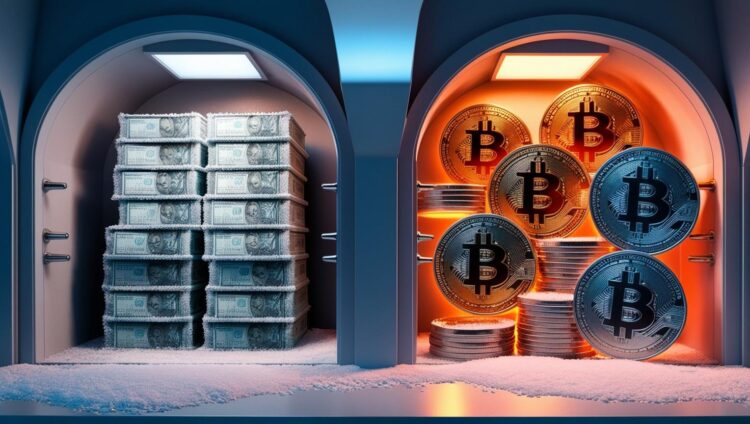Last updated on July 30th, 2025 at 04:07 am
Imagine waking up to find you can’t access your bank account because your money has been frozen, or discovering that your cryptocurrency wallet has been blacklisted, locking you out of your funds. Both situations involve controlling access to assets, but they happen in different ways.
Banks freeze fiat money to prevent fraud, comply with regulations, and maintain market stability. Blockchain networks, on the other hand, blacklist specific crypto addresses to block transactions tied to criminal activity or violations of network rules. These measures are justified by financial authorities as necessary to protect the financial system, whether it’s to investigate suspicious activity or prevent illicit transactions.
However, the balance between ensuring security and limiting financial freedoms remains a point of debate. Critics argue that freezing assets or blacklisting addresses may infringe on individual rights, while others contend these controls are essential for maintaining a secure, regulated system.
In this article, we’ll explore how freezing fiat money works, how crypto wallet blacklisting functions, and the key differences between the two practices.
Why Banks Freeze Fiat Assets
Freezing fiat money isn’t random, it’s a legal process designed to prevent illegal activities. Banks freeze accounts primarily for three reasons: suspicious activity, following legal regulations, and complying with international sanctions.
Banks must monitor transactions for anything unusual, like large transfers or behaviour that doesn’t fit with the account’s normal pattern. If something looks suspicious, they must file a Suspicious Activity Report (SAR) with authorities, such as the U.S. Financial Crimes Enforcement Network. Once an SAR is filed, the bank may freeze the account temporarily while it investigates.
International sanctions are another reason banks may freeze accounts. These sanctions restrict financial transactions with individuals, groups, or countries involved in illegal activities, such as terrorism or human rights violations. Banks are required to ensure they aren’t facilitating transactions with entities on restricted lists, like the ones maintained by the U.S. Office of Foreign Assets Control (OFAC).
For instance, when Russia invaded Ukraine in 2022, the U.S. and European countries imposed heavy sanctions on Russia. These sanctions made banks freeze the assets of Russian officials, banks, and companies, preventing them from accessing their money or using international financial systems.
Banks have the power to control access to money because they are the gatekeepers of fiat currency. While these actions follow legal rules, they also raise concerns about privacy and the possibility of overreach, as people have limited options to challenge these decisions unless they go through the legal system. For example, during the “Freedom Convoy” protests in Canada, the government used a law called the Emergencies Act to freeze the bank accounts of people and groups supporting the protests, including those who donated money to the cause.
How Crypto Wallet Blacklisting Works
Crypto wallet blacklisting refers to the process of restricting or blocking specific cryptocurrency addresses from interacting with a blockchain or participating in certain activities, such as receiving, sending, or trading assets.
This can be done by stablecoin issuers like USDT (Tether) and USDC (USD Coin), or even by the blockchain networks themselves, typically to prevent illegal activities like fraud, money laundering, or terrorist financing.
There are two main types of wallet blacklisting in the crypto space: protocol-enforced blacklists and token-level freezing.
Protocol-enforced Blacklists
Protocol-enforced blacklists involve blacklisting addresses at the blockchain protocol level, affecting all assets on that blockchain. A prominent example of this occurred with the Tornado Cash mixer, a privacy tool that was blacklisted by multiple entities, including the U.S. government, due to its use in illicit activities like money laundering.
In this case, the entire blockchain protocol was involved in blocking the associated addresses. This move sparked significant controversy in the crypto community, with critics arguing it was an overreach that undermined the privacy and freedom that blockchain technology is known for.
Token-level Freezing
Token-level freezing, on the other hand, occurs when specific issuers of tokens, such as stablecoins, choose to block addresses from interacting with their particular tokens. Circle, the issuer of USDC, has the ability to freeze addresses that are found to be involved in suspicious activities or in violation of sanctions.
For instance, after the collapse of the FTX exchange in 2022, Circle froze wallets associated with FTX to prevent stolen funds from being transferred. Unlike protocol-enforced blacklists, token-level freezing affects only specific tokens like USDC, not the entire blockchain. This raised concerns about the centralized control of stablecoins and whether companies should have the authority to block transactions at all.
Key Differences Between Fiat Freezing and Crypto Blacklisting
Fiat freezing and crypto blacklisting both restrict access to financial assets, but they operate in very different ways. Here are the key differences:
Aspect | Fiat Freezing | Crypto Blacklisting |
| Enforcement | Centralized (banks, governments, financial institutions) | Decentralized (blockchain protocols, smart contracts, token issuers) |
| Reversibility | Typically reversible through legal processes | Often permanent and difficult to reverse |
| Scope of Control | Freezes entire accounts, locking all assets | Targets specific wallet addresses or assets (e.g., USDT, USDC) |
| Transparency | Opaque, with limited disclosure unless through legal action | Public visibility on blockchain ledgers, though reasons may be unclear |
Reversibility
A major difference between fiat freezing and crypto blacklisting is how reversible the actions are. Fiat freezes are usually reversible and can be undone through legal processes. If an account is frozen due to suspicious activity or government orders, the account holder can often fix the issue by proving their innocence or following legal steps. For example, after an investigation or court decision, the frozen funds can be released.
In contrast, crypto blacklisting is often permanent and cannot be easily undone. Once a wallet or address is blacklisted, especially at the protocol level, it may stay blocked permanently. Blockchain networks like Ethereum can disable addresses permanently for violating their rules or engaging in illegal activities.
Even when token issuers like Circle (which controls USDC) freeze addresses, reversing it is challenging, particularly when the freeze happens through smart contracts. There is no easy way to dispute the decision.
Scope of Control
The scope of control is different between fiat freezing and crypto blacklisting. When a bank freezes a fiat account, it typically locks all assets within that account, preventing the account holder from accessing or transferring any funds. This centralized control means the bank has authority over a person’s entire account.
On the other hand, crypto blacklisting is usually more specific. It targets individual wallet addresses or specific assets, like stablecoins (e.g., USDT or USDC), rather than freezing an entire account. For example, if a wallet is blacklisted, the account holder can still access other assets or use different cryptocurrencies.
This decentralized approach offers more flexibility in how restrictions are applied, but it can cause confusion if some assets are blocked while others are still available for use.
Transparency and Public Accessibility
Another key difference is the level of transparency in the blacklisting process. Fiat freezing is usually not transparent. Banks and governments typically don’t share the reasons behind freezes, and the process is kept private unless it’s revealed through legal action or the media. This can make it unclear for both the account holder and the public.
On the other hand, crypto blacklisting often happens on a public ledger, especially on blockchains like Ethereum. While the exact reasons for blacklisting or who initiated it might not be obvious, the fact that an address is blacklisted is visible to anyone. This adds a level of transparency that’s not seen in traditional fiat systems.
READ MORE: Blacklisting in Crypto: A Necessary Evil or a Step Backward?
Is Financial Control Inevitable?
The balance between financial control and financial freedom is a complex issue. On one hand, centralized systems like banks are necessary for asset protection, ensuring regulations are followed and preventing illegal activities. However, this control can limit personal freedom and privacy. On the other hand, blockchain and DeFi offer the promise of financial freedom, where individuals can have full control over their assets without relying on banks or other intermediaries.
A truly decentralized approach to financial security would allow individuals to manage their wealth directly through digital wallets and blockchain platforms. This would provide more transparency, privacy, and control, but it also comes with challenges, such as the potential for misuse and difficulty in integrating with global financial systems.
As both banking and blockchain evolve, they may begin to overlap. Traditional banks could adopt blockchain technology for better efficiency and security, while DeFi platforms may face more regulation to ensure they comply with laws. The future of asset management might see a combination of both systems, offering a balance between the stability of traditional banking and the freedom of decentralized finance.
In the end, the future of finance may involve a hybrid approach, where people can choose between centralized or decentralized systems based on their needs, ensuring both security and freedom in managing their assets.
Disclaimer: This article is intended solely for informational purposes and should not be considered trading or investment advice. Nothing herein should be construed as financial, legal, or tax advice. Trading or investing in cryptocurrencies carries a considerable risk of financial loss. Always conduct due diligence.
If you would like to read more articles like this, visit DeFi Planet and follow us on Twitter, LinkedIn, Facebook, Instagram, and CoinMarketCap Community.
Take control of your crypto portfolio with MARKETS PRO, DeFi Planet’s suite of analytics tools.”





















